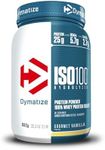Buying Guide for the Best Whey Proteins
Choosing the right whey protein can significantly impact your fitness and health goals. Whey protein is a popular supplement for those looking to build muscle, lose weight, or simply increase their protein intake. When selecting a whey protein, it's important to consider factors such as your dietary needs, fitness goals, and any potential allergies or intolerances. Understanding the key specifications of whey protein can help you make an informed decision that aligns with your personal health objectives.Protein ContentProtein content refers to the amount of protein per serving in the whey supplement. This is crucial because protein is the primary nutrient that helps in muscle repair and growth. Whey protein products typically range from 20g to 30g of protein per serving. If your goal is to build muscle, you might want to opt for a higher protein content. For general health or weight management, a moderate protein content might suffice. Consider your daily protein needs and how much you are getting from other sources when choosing the right protein content for you.
Type of Whey ProteinThere are three main types of whey protein: concentrate, isolate, and hydrolysate. Whey concentrate is the most common and contains some fat and lactose, making it a good all-around choice. Whey isolate has most of the fat and lactose removed, making it a better option for those who are lactose intolerant or looking for a leaner protein source. Whey hydrolysate is pre-digested for faster absorption, which can be beneficial for post-workout recovery. Your choice should depend on your dietary restrictions and how quickly you need the protein to be absorbed.
Flavor and TasteFlavor and taste are important because they can affect your willingness to consistently use the product. Whey proteins come in a variety of flavors, from chocolate and vanilla to more exotic options like cookies and cream. If you plan to mix your protein with other ingredients, consider how the flavor will complement them. It's a good idea to try a small sample or read reviews to ensure the taste is something you will enjoy regularly.
Additives and IngredientsAdditives and ingredients refer to any additional components in the whey protein, such as sweeteners, thickeners, or vitamins. Some people prefer a clean protein with minimal additives, while others might appreciate added vitamins or minerals. If you have dietary restrictions or preferences, such as avoiding artificial sweeteners or needing a gluten-free product, check the ingredient list carefully. Choose a product that aligns with your health goals and dietary needs.
DigestibilityDigestibility is about how easily your body can break down and absorb the protein. Some people may experience digestive discomfort with certain types of whey protein, especially if they are lactose intolerant. Whey isolate and hydrolysate are generally easier to digest due to lower lactose content. If you have a sensitive stomach, you might want to start with a small serving to see how your body reacts, or choose a product specifically designed for better digestibility.














